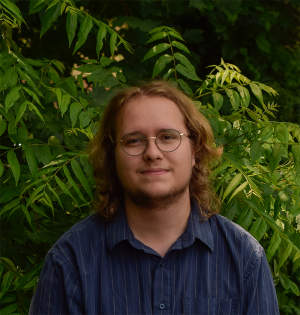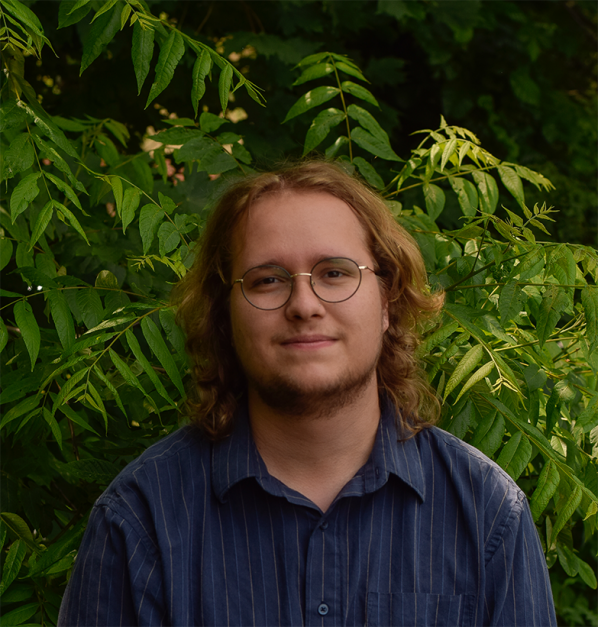Honors College senior and sustainable development major Ben Pluska has been selected as a 2023-24 Rachel Carson Campus (RCC) Fellow. Pluska says, “RCC Fellows are competitively selected nationwide to carry out educational, organizing, and communications projects that support RCC’s mission from their campus and into the community.” Pluska is currently working on their Honors thesis, Sensing Environmental (In)Justice Amdist Late Industrialism in Eastern North Carolina. Under the directorship of Dr. Rebecca Witter, associate professor in the Department of Sustainable Development, Pluska is engaging with industrialized development and how it is ravaging lives and landscapes in rural Eastern North Carolina. Pluska’s thesis committee also includes: Dr. Dana Powell, associate professor Graduate Institute of Humanities in Medicine at Taipei Medical University, Dr. Anatoli Ignatov, associate professor in the Department of Sustainable Development, and Dr. Christina Verano Sornito, assistant professor in the Department of Anthropology. Pluska’s RCC fellowship project directly supports their thesis work. They explained that the RCC project provides them with the opportunity “to operationalize the sensory and experimental ethnographic methods I am employing in my thesis. It will also provide students at Appalachian State University a chance to engage with ongoing issues of environmental (in)justice and advance an understanding of how art, activism, and scholarship can be utilized to convey (in)justice and move toward rectification.”
The Rachel Carson Council “promotes Carson’s ecological ethic that combines scientific concern for the environment and human health with a sense of wander and reverence for all forms of life in order to build a sustainable, just, and peaceful future.” Pluska shared that the RCC fellowship:
“Provides me with the support to execute an audio/visual exhibition depicting and 'sounding' the injustices experienced by disenfranchised communities in Eastern North Carolina. This fellowship will not only contribute to ongoing work but will also allow me to implement a more engagement-oriented project centered around environmental justice (EJ) within my on-campus community at Appalachian State University.”
Pluska’s research interests grow out of their work with the Eastern North Carolina Environmental Justice Collaborative (EJ Co-Lab), an interdisciplinary, community-engaged research initiative, co-founded by Dr. Witter, Dr. Powell, and community-based partners in 2020. Pluska explained the goal of their thesis: “In Sampson County, environmental harms accumulate, and the people that live there can smell, feel, taste, and hear it. Smithfield Foods and Mountaire operate Concentrated Animal Feeding Operations, where 2,500 hogs and 125,000 chickens are grown and shipped to slaughter. These animals can produce 10,000 gallons of waste per day and a smell that many describe as ‘nauseating’ and ‘disgusting’ with a deep sweet and high sour tinge. All the while, the Enviva wood pellet processing plant produces dust, watering the eyes and inducing coughs for those who live close by. There’s also the largest landfill in the state (Green for Life), which accepts waste, some of it toxic, from all counties in the state and emits a rotting smell, both from the landfill site and the tens of trucks headed into Sampson County every day. These trucks awaken residents with the smell and their constant automatic grumble and hiss. The futures of these communities are riddled with harm, assembled both by these industries and the government which permits them. I will work to engage ethnographic methods to better understand the sensorium of injustice in Eastern North Carolina. I will then argue the need for empathic policy that encompasses the experiences of those facing environmental injustices in Sampson County.”
For their RCC project, Pluska is currently working on an independent study of EJ theory and activism with Dr. Witter. Alongside that, they will build a multi-modal exhibition that shows the myriad of harms in Sampson County and contextualizes them in the activist work being done to mitigate them. To-date, Pluska has collected photographs and ethnographic data on various ecological and industrial landmarks in Eastern NC as well as portraits of prominent figures in the EJ movement of Eastern NC and community members who live with these environmental (in)justices. They plan an exhibition in November at the Looking Glass Gallery in the Plemons Student Union showcasing media that conveys the stories of environmental and social harm, perseverance, and systemic racism in Eastern NC. Pluska will then take the materials from this exhibit and their thesis showcasing them in an exhibition space in Sampson County.
Pluska explains that the broader “project contributes to a larger conversation of how activism, academia, and art can intersect and inform one another in mitigating and working against environmental harms and injustices by using subjective sensorial accounts and oral histories of landscapes.” They further shared, “my place in this work excites me greatly, as it is tapping into and hopefully helping to expand upon the ways in which environmental (in)justice is understood outside of quantitative methods alone, and towards a more multifaceted approach to understanding and fighting against environmental injustice. If we are to truly enact change and mitigate harm for disenfranchised communities, such as those in Eastern NC, I believe that first, you must gain an empathetic perspective of the harm. By contributing to an understanding of people’s experiences of environmental (in)justice, this work may build the foundation for activism and policy that is inextricably linked to the qualitative reality of those living among harmful industries.”
Pluska learned about the RCC fellowship from their mentor, Dr. Witter. App State is an RCC affiliate campus and the Rachel Carson Council is committed to supporting work in rural NC. In her efforts to connect students with research and community engaged research, Dr. Witter asks students who might be interested in these opportunities, “Who are you not to apply?” For the application, Pluska wrote and submitted a 3-page project proposal outlining how they will engage the App State community in EJ work. Applicants were selected from across the country and different campuses. The council reported that this was the “largest, most talented and diverse group of applicants ever.” Pluska advises other Honors students to
“take any opportunity that presents itself to you. There is never any harm in applying. Find mentors that believe in you and who not only will support you in your projects and undergraduate but will support you in your lifelong goals in whatever field you hope to go into. No problem or path to solve it is too obscure. Find the channels and people that understand and empathize with your view of the world and move through them – making connections with people who want to work like you and think like you.”
Pluska believes they can contribute to a more diverse understanding of EJ through their research assistantship, photography, and writing. With this support from the RCC fellowship, this is now an achievable goal. Pluska explained that this work will directly feed into their future goals of pursuing a Ph.D. in environmental anthropology and working with community-based non-profits as a research consultant.
Top photo of Ben Pluska by Jo Husk.

